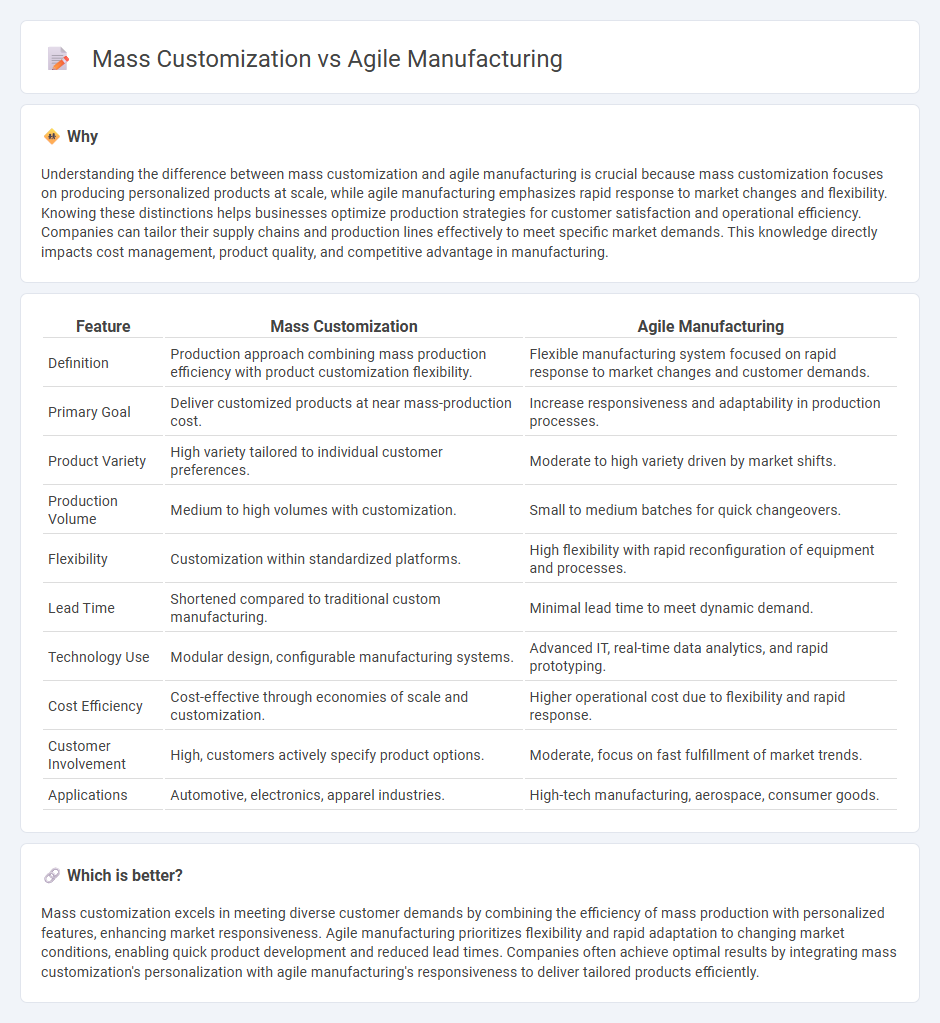
Mass customization enables manufacturers to produce tailored products efficiently by integrating flexible production systems with customer-specific requirements, maximizing personalization without sacrificing scale. Agile manufacturing focuses on rapid responsiveness and adaptability across the supply chain to meet unpredictable market demands and reduce lead times through modular processes and cross-functional teams. Explore how these innovative strategies transform modern manufacturing by balancing efficiency and flexibility.
Why it is important
Understanding the difference between mass customization and agile manufacturing is crucial because mass customization focuses on producing personalized products at scale, while agile manufacturing emphasizes rapid response to market changes and flexibility. Knowing these distinctions helps businesses optimize production strategies for customer satisfaction and operational efficiency. Companies can tailor their supply chains and production lines effectively to meet specific market demands. This knowledge directly impacts cost management, product quality, and competitive advantage in manufacturing.
Comparison Table
| Feature | Mass Customization | Agile Manufacturing |
|---|---|---|
| Definition | Production approach combining mass production efficiency with product customization flexibility. | Flexible manufacturing system focused on rapid response to market changes and customer demands. |
| Primary Goal | Deliver customized products at near mass-production cost. | Increase responsiveness and adaptability in production processes. |
| Product Variety | High variety tailored to individual customer preferences. | Moderate to high variety driven by market shifts. |
| Production Volume | Medium to high volumes with customization. | Small to medium batches for quick changeovers. |
| Flexibility | Customization within standardized platforms. | High flexibility with rapid reconfiguration of equipment and processes. |
| Lead Time | Shortened compared to traditional custom manufacturing. | Minimal lead time to meet dynamic demand. |
| Technology Use | Modular design, configurable manufacturing systems. | Advanced IT, real-time data analytics, and rapid prototyping. |
| Cost Efficiency | Cost-effective through economies of scale and customization. | Higher operational cost due to flexibility and rapid response. |
| Customer Involvement | High, customers actively specify product options. | Moderate, focus on fast fulfillment of market trends. |
| Applications | Automotive, electronics, apparel industries. | High-tech manufacturing, aerospace, consumer goods. |
Which is better?
Mass customization excels in meeting diverse customer demands by combining the efficiency of mass production with personalized features, enhancing market responsiveness. Agile manufacturing prioritizes flexibility and rapid adaptation to changing market conditions, enabling quick product development and reduced lead times. Companies often achieve optimal results by integrating mass customization's personalization with agile manufacturing's responsiveness to deliver tailored products efficiently.
Connection
Mass customization leverages Agile Manufacturing principles to optimize production flexibility and responsiveness, enabling personalized products at scale. Agile Manufacturing employs modular processes and rapid reconfiguration to accommodate diverse customer specifications efficiently. This synergy reduces lead times and costs while enhancing product variety and customer satisfaction.
Key Terms
Flexibility
Agile manufacturing emphasizes rapid adaptability to market changes and customer demands by utilizing flexible processes and skilled teams, while mass customization focuses on producing personalized products at scale through modular design and advanced automation. Flexibility in agile manufacturing is achieved through dynamic resource allocation and continuous improvement, contrasting mass customization's reliance on configurable production systems to maintain efficiency. Explore how these approaches balance customization and operational agility to meet evolving consumer needs.
Personalization
Agile manufacturing excels in quickly adapting production processes to evolving customer preferences, enabling high levels of product customization while maintaining efficiency. Mass customization combines the scale of mass production with personalized features, leveraging modular design and flexible manufacturing systems to cater to individual demands. Discover how these manufacturing strategies enhance personalization in industries and redefine consumer engagement.
Efficiency
Agile manufacturing enhances efficiency by rapidly adapting production processes to fluctuating market demands, reducing lead times, and minimizing inventory costs. In contrast, mass customization streamlines efficiency through standardized modular designs that allow personalized products without sacrificing economies of scale. Explore detailed strategies and case studies to understand how these approaches revolutionize operational efficiency.
Source and External Links
Agile manufacturing - Agile manufacturing is a modern production approach enabling companies to respond swiftly and flexibly to market changes while maintaining quality and cost control; it emphasizes adaptability and proactive responses to changing customer demands, complementing lean manufacturing principles focused on waste reduction.
What Is Agile Manufacturing? Lean vs. Agile - Agile manufacturing is a methodology focused on rapid response to customers and market demands, leveraging speed and flexibility as competitive advantages, often building upon lean manufacturing practices such as small batch production and continuous improvement.
Agile Manufacturing: Benefits, Challenges, and Key ... - Agile manufacturing prioritizes responsiveness, speed, and innovation, as demonstrated by Dell's success in eliminating inventory bottlenecks and enabling customer-driven production with improved quality, productivity, and shorter cycle times.
 dowidth.com
dowidth.com